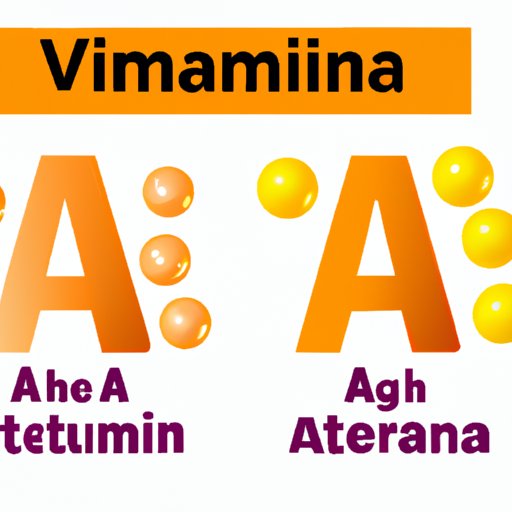
Introduction
Vitamin A is an essential nutrient that plays a vital role in many body functions, including maintaining healthy eyesight and immune system. But did you know that Vitamin A is also crucial for our skin health? In this article, we’ll explore the various benefits of Vitamin A for your skin and how to incorporate this essential nutrient in your skincare routine.
A beginner’s guide to Vitamin A and its benefits for the skin
Vitamin A is a fat-soluble vitamin that comes in different forms, including retinol, retinal, and retinyl palmitate. These different forms are converted into retinoic acid in the body, which is essential for healthy skin.
Vitamin A is known for its multiple benefits to the skin, including improving the skin’s texture, reducing wrinkles, and promoting collagen production. Collagen is a protein that provides structure and elasticity to the skin, and Vitamin A helps to produce more collagen, which keeps the skin looking supple and youthful.
Vitamin A is not only beneficial to the skin, but it also plays a crucial role in overall body health. It is essential for maintaining healthy vision, supporting the immune system, and promoting proper cell growth and development.
How Vitamin A can help to reduce acne and improve skin health
Acne is a skin condition that affects millions of people worldwide, but Vitamin A can help prevent and reduce acne breakouts. Vitamin A helps to normalize the skin’s shedding process, which prevents dead skin cells from clogging pores and leading to breakouts.
Furthermore, Vitamin A has anti-inflammatory properties that can reduce redness and inflammation associated with acne. It can also promote healing and repair damaged skin tissues, leaving the skin looking healthy and youthful.
Vitamin A: The magical ingredient for anti-aging and youthful skin
Vitamin A is a game-changer when it comes to anti-aging skincare. One of the most significant benefits of Vitamin A is that it promotes cell turnover, which means it helps the skin to shed old skin cells and replace them with new ones. This process helps to reduce the appearance of fine lines and wrinkles, leaving the skin looking smoother and more youthful.
It also helps to stimulate collagen production, which further enhances the skin’s elasticity and firmness. To achieve optimal results in anti-aging skincare, it’s essential to use Vitamin A products consistently and follow a regular skincare routine.
The role of Vitamin A in treating hyperpigmentation and dark spots
Hyperpigmentation and dark spots are common skin conditions that can be caused by various factors, including sun damage, hormonal imbalances, and aging. Fortunately, Vitamin A is an effective treatment for these conditions.
Vitamin A helps to fade hyperpigmentation and dark spots by boosting cell turnover and promoting the growth of new skin cells. It is particularly effective in treating melasma, age spots, and other types of discoloration. However, it’s essential to remember that sun exposure can worsen hyperpigmentation, so it’s crucial to wear sunscreen while using Vitamin A products to prevent further damage.
The different types of Vitamin A and which one is best for your skin
There are different forms of Vitamin A available in skincare products, including retinol, retinal, and retinyl palmitate. While all forms of Vitamin A are effective, they vary in terms of their potency and potential side effects.
Retinol is the most common form of Vitamin A found in skincare products and is effective in treating various skin concerns. Retinal is more potent than retinol and can deliver faster results, but it may cause more skin irritation. On the other hand, retinyl palmitate is a milder form of Vitamin A that is better suited for people with sensitive skin.
To determine which type of Vitamin A is best for your skin, it’s essential to consider your skin type, the severity of your skin concerns, and your skin’s sensitivity. Consulting with a dermatologist can also help you choose the right skincare products that contain the appropriate form of Vitamin A.
How to incorporate Vitamin A into your skincare routine for the best results
When introducing Vitamin A into your skincare routine, it’s crucial to start with a low concentration and gradually increase it over time to prevent skin irritation. It’s also important to follow a regular skincare routine, including cleansing, toning, and moisturizing.
While Vitamin A is a powerful ingredient that offers many benefits to the skin, it can also be degrading when exposed to air and light. Therefore, it’s essential to store Vitamin A skincare products correctly and use them within their expiration dates.
Conclusion
Vitamin A is an essential nutrient that offers many benefits for healthy and youthful skin. From reducing wrinkles and improving texture to treating hyperpigmentation and reducing acne breakouts, Vitamin A remains one of the most powerful ingredients in skincare.
By incorporating Vitamin A products into your regular skincare routine and using them consistently, you can achieve healthy, youthful-looking skin that glows from within.




